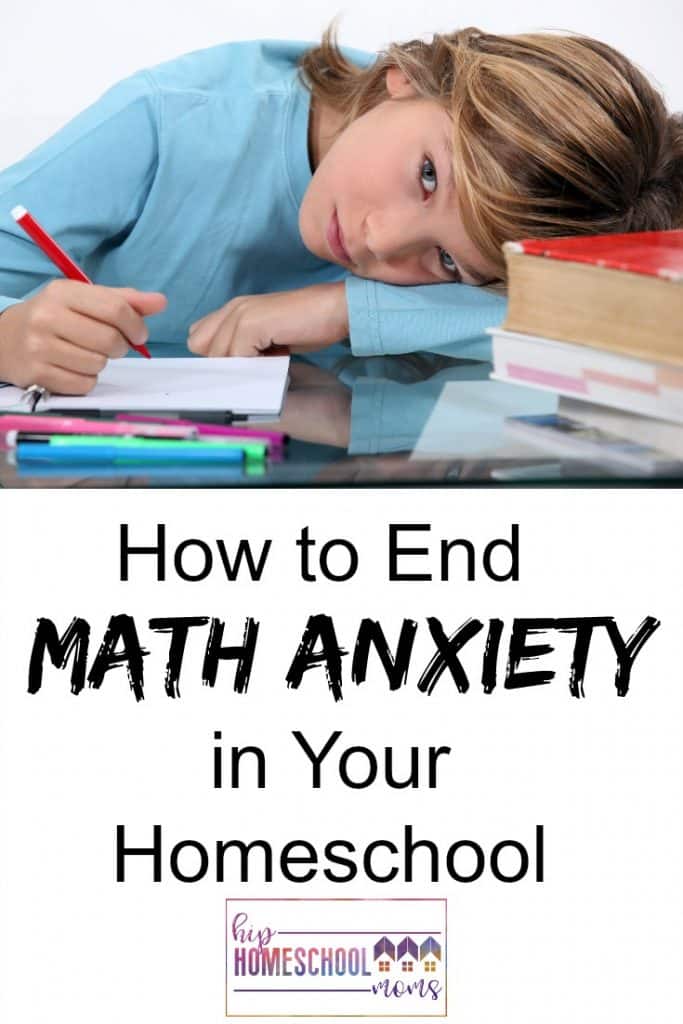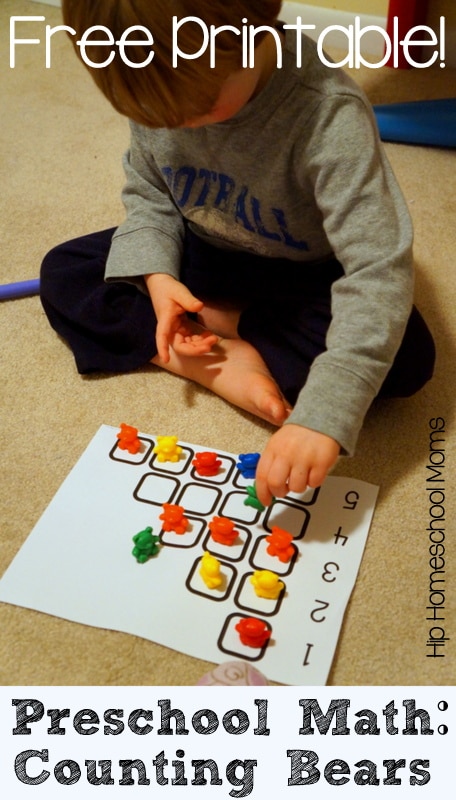10 Tips for Ending Math Anxiety in Your Homeschool
It’s 11:30 in the morning, and it’s almost time for lunch. Your 4th grade child started working on his math two hours ago and has not yet finished. He’s now staring off into the distance and still not doing his math.
Does this ever happen in your homeschool? I experienced this scenario for many years! I thought I might lose my mind as a result of struggling with this year after year after year!

Fast forward to high school. At the dining room table, we are painstakingly working through problem after problem of Algebra. Each day I take a full hour (at least) out of my day to give one-on-one math instruction to a sophomore. The program is too intensive for our style.
End the Math Battle Forever
You see where I’m going here. It’s not that my son wasn’t smart. That totally wasn’t the case. (Years later, he got an A in college physics even though we only went as far as geometry in high school.) So why did he have all that trouble for so many years with math? How could I have ended the math battle all those years ago? How can you end math anxiety in your homeschool? I’ll share some tips with you! Hopefully this information will help you end the math anxiety in your homeschool before you’ve had to endure years and years of it needlessly!
1. Aim for short bursts of real learning.
It’s better to spend two 20-minute blocks throughout the day on focused math practice than 3 hours of nothing. Maybe your child can’t do 50 problems a day. Maybe 20 is more realistic. Even in high school, for a full credit, 1 hour should be more than ample. For middle school, 45 minutes should be sufficient, and for elementary students, no more than 30 minutes (and maybe less for very young students).
2. Choose a math program that works for your student right now, but be willing to change later.
If you find a program that works right now, that’s great! But keep in mind that it may not work forever. Be flexible. A particular math program may work very well for your child for several years, and then one year it may not work well any more. That’s ok, and it’s very common.
We tend to think that we must stick with whatever curriculum we’ve been using even when this happens, but it’s really ok to change if you need to! There are so many great math curriculums out there! And many of them offer free online placement tests and even sample chapters to try out. Look into the huge variety of supplements too–such as easy-to-play apps and games. Of course there will be ups and downs with any math program, but it’s ok (it’s even a good idea) to change if the one you’re currently using just isn’t working for your child any more.
3. Decide when to stick it out and when to move on.
There are times to stick with a program and endure, and there are times when it’s better to move on and find a new curriculum that works better for your child’s needs and learning style. If your child is truly having trouble with a particular program, think about what’s going on and talk to your child about it too.
Maybe that curriculum has become too boring, too hard, or too easy. Maybe your child needs to stop and take some time to learn the basic math facts before continuing with your current curriculum or a different one. Maybe your child is having trouble focusing on school work because of a problem he or she is going through. Maybe it’s an issue of self-discipline. Or it could possibly be that your child has some kind of learning difficulty. Taking some time to talk with your child and assess the situation is a great idea!
4. Keep practicing year round.
Many homeschoolers enjoy taking a break from school over the summer, but students who tend to have math anxiety may need to keep at it year round. Yes, we all need breaks now and then, but a better option might be to continue doing math all year but take a 1- or 2-week break from it a few times during the year rather than taking a break from math for the entire summer. Math is one of those subjects that can be hard to pick back up after an extended break. If you don’t usually homeschool during the summer, try continuing with this one subject over the summer–even if you only do a few minutes each day or do it two or three times a week. You may be surprised at how much this helps to reduce math anxiety when your regular homeschool year begins again!
5. Make sure your student really understands what he or she is learning.
It’s easy to show our children how to perform a certain math operation, have them practice it, give them tests to see how they perform, and then move on. What we may not realize at the time, though, is that they may be simply memorizing the operation without having any idea of how and why it works. It’s important for our children (and for us as their teachers!) to understand how and why these math operations work in order to build on that knowledge later on.
If your math program doesn’t do a good job of explaining the how and why of what is being taught, you may need to look for a different curriculum. At very young ages, your children may not really need to know the details of how and why certain mathematical ideas work certain ways, but as they get older, it is much more important to understand these concepts. If our students are to remember and build on their knowledge, they’ve got to truly understand what they’re doing.
6. Pay attention to your child’s handwriting.
This may sound simple, but sometimes our children’s handwriting can interfere with their math performance. When my son was in elementary school, he had terrible handwriting! When he wrote down math problems, he was often sloppy. His sloppy handwriting caused him not to line numbers up properly, and that often caused him to get an incorrect answer. Sloppy handwriting can cause mistakes even when doing a simple math operation like addition or subtraction.
7. Have a good attitude about math.
This is another idea that may sound simple, but your attitude as the teacher can have a lot to do with your child’s attitude toward math! When your student is frustrated and upset, it’s hard not to get frustrated and upset along with him or her. Keep in mind, though, that your students often get their attitudes toward math (and school in general) from you. If you’ve gotten frustrated or short-tempered while teaching your child math, you’ll need to demonstrate your new positive attitude for your child to be able to change his/her attitude too. This may take some time if your child has struggled with math for a long time, so be patient!
8. Go back and do an easier level.
If your child is struggling with most (or all) of the concepts that are being taught that year in his/her math curriculum, it’s a good idea to go back to an easier level to brush up before going back to the current level. Even if your child needs to go back 2 or 3 grade levels for a while, it’s better to do that than to continue to struggle! If you’re worried that he or she will fall behind if you do this, don’t worry! Your child will learn much more by going back and catching up on things he or she missed or didn’t fully learn or understand than he or she will if you simply continue to push ahead without real learning and understanding.
9. Make sure your child knows that you’re both on the same team.
Sometimes when I’m teaching a subject that is difficult or that one of my children has a hard time with, my children think I’m angry or upset with them. Or they may think they’re in trouble or have done something wrong. In reality, I’m just concentrating or problem solving, but they don’t realize that. Make sure your children know that they aren’t in trouble and that you’re not upset or angry. It’s ok for them to know that you’re thinking and problem solving and trying to come up with solutions to the problems they’re having, but you don’t want them to think that you’re upset with them because of their troubles.
10. Get help if you need it.
One of the best things about homeschooling right now is that there is so much help available! There are lots of different curriculums you can try, whether textbooks or online. Or you may decide to get together with another homeschooling family with a stronger math background and understanding for math classes. Some co-ops will allow you to join just one or two classes that you don’t feel comfortable teaching. And there are also more and more local tutors and tutoring centers that may be able to help you.
So if your children are having a hard time with math, don’t get discouraged! Don’t feel alone! Read over these tips and ideas, and take some time to think about what might help your children better succeed in math. Even if you have to slow down or go back to easier curriculum or a lower grade level, it’s ok! It’s worth doing whatever you need to do to get a fresh start and make math a subject that you and your children can enjoy again.
Do you have specific questions about math or teaching math in your homeschool? If so, please let us know in the comments below! We’ll do our best to help answer your questions in future articles, and we’d love to hear from you!
You May Also Like:
5 Creative Ways to Teach Homeschool Math (That Aren’t Curriculum!)
Preschool Math with Counting Bears (Free Printable!)
Fun on the Farm with Apple Tree Math













